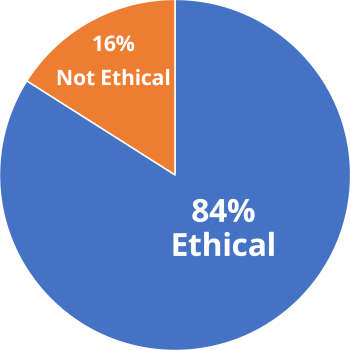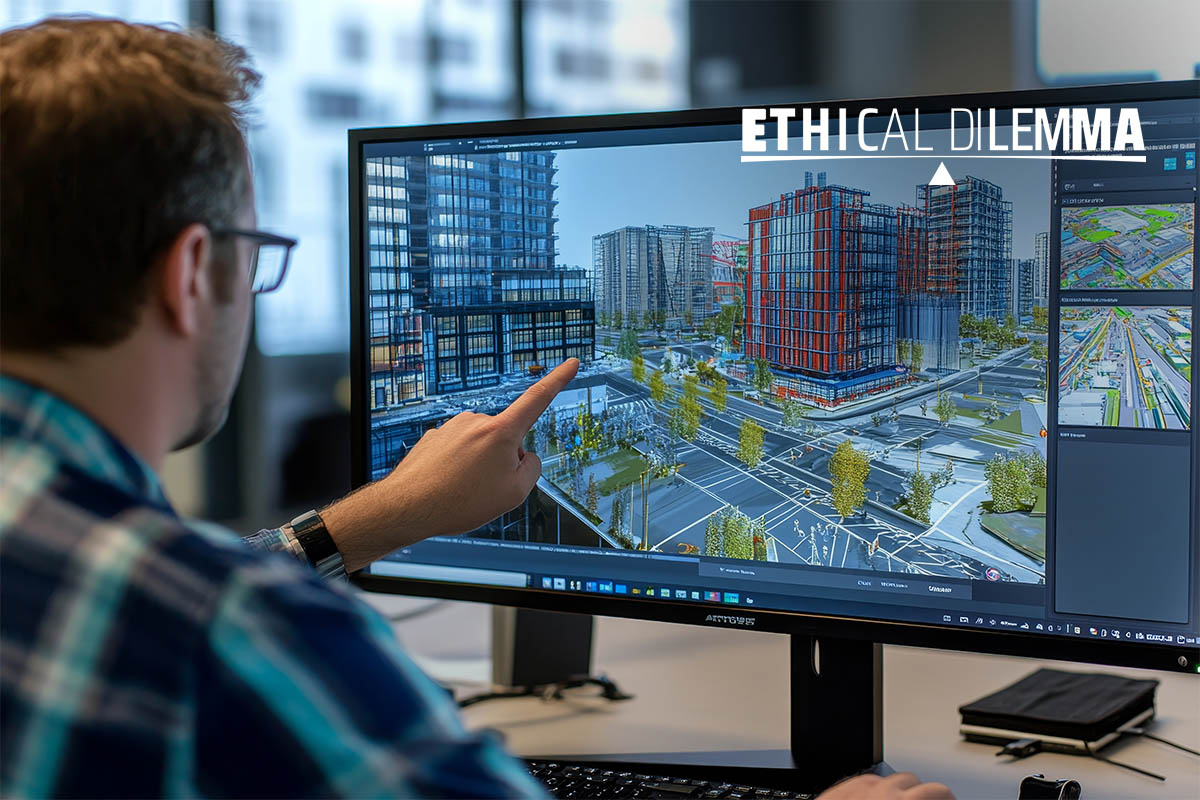This is the September 2023 edition of our monthly series of Ethics case studies titled What Do You Think? This series is comprised of case studies from NSPE archives, involving both real and hypothetical matters submitted by engineers, public officials and members of the public.
Your peers and the NSPE Board of Ethical Review have reviewed the facts of the case as shown below. And, here are the results.
Your opinion has been registered for the September 2023 edition of our monthly series of Ethics case studies titled What Do You Think?
Your vote is recorded as:

Want to know how your peers voted?
We’ll send you an email with the poll results on September 26.
We’ll send you an email with the poll results on September 26.
Your opinion has been registered for the September 2023 edition of our monthly series of Ethics case studies titled What Do You Think?
Your vote is recorded as:

Want to know how your peers voted?
We’ll send you an email with the poll results on September 26.
We’ll send you an email with the poll results on September 26.
A Review of the Facts
Engineer Larry is a professional engineer employed by the Army Corps of Engineers. Because of a substantial decrease in the work load, Larry was informed that his position with the Corps’ River Basin Planning Section was being abolished and that he would be reassigned.
He was asked to accept a position with the Coastal and Special Studies Section as a staff engineer where he would be supervised by an experienced engineer. Larry accepts the new assignment even though he lacks the technical expertise to perform the required duties.
What Do You Think?
Was it ethical for Larry to accept the new assignment even though he lacks the technical expertise to perform the required duties?
Here is the result of our survey of your peers:

Applicable NSPE Code References:
II.2
Engineers shall perform services only in the areas of their competence.II.2.a
Engineers shall undertake assignments only when qualified by education or experience in the specific technical fields involved.III.2.e
Engineers shall continue their professional development throughout their careers and should keep current in their specialty fields by engaging in professional practice, participating in continuing education courses, reading in the technical literature, and attending professional meetings and seminars.
Discussion
It is universally accepted that it is unprofessional for an engineer to attempt to practice in a field of engineering in which the engineer is not proficient. Most state engineering registration statutes or rules of professional conduct emphasize that view and the point is also clearly articulated in the NSPE Code of Ethics in Code II.2 et seq.
While the language of the Code appears plain in meaning, it is obvious that the language cannot be interpreted only in its literal sense. To do so could restrict an engineer’s practice to a very narrow area and would not recognize that the practice of engineering is dynamic and fluid. Indeed, all engineers have a parallel obligation to expand their understanding and knowledge through broadened professional practice.
In Case 85-3 the Board previously considered a situation involving a local county ordinance that required that the position of county surveyor be filled by a P.E. The first appointee to the position was not a P.E. and was therefore deemed unqualified to continue in the position. The county commissioners met and decided to appoint a P.E. who had experience and educational background solely in the field of chemical engineering. The engineer accepted the position. The duties and responsibilities of the position of county surveyor included oversight of surveying reports and highway improvement projects but not the actual preparation of engineering and surveying documents.
In deciding in Case 85-3 that the engineer was unethical, the BER stated that the Code clearly requires the engineer to perform services only in his area of competence and that it would not be consistent with the Code for the engineer to act as a county surveyor when his expertise was limited to the field of chemical engineering. We noted that the county surveyor must have proficiency and competence in surveying in order to properly perform his responsibilities and could not expect to rely upon his subordinates in execution of his duties.
Case 85-3 can be properly distinguished from the case at hand. It involved an engineer who was responsible for personally performing supervisory functions and administering the operations of a technical services department within a governmental body. In Case 85-3 the engineer had to possess the knowledge, experience, and background in surveying to direct and manage the technical aspects of his department.
In the case at hand, Larry is accepting a position as a staff engineer of a governmental agency and would be reporting to an experienced engineer. We do not read the Code to prohibit Larry from accepting this new assignment. To do so would be to limit the ability of engineers to expand their level of experience and knowledge. We believe the intent of Code II.2 et seq. is to limit individual engineers from undertaking assignments or positions of authority and responsibility where they lack adequate competence or experience.
We do not believe the Code’s intent is to prohibit engineers, whose work is subject to review and oversight by senior engineers, from accepting new and different tasks and duties, thereby growing professionally. To decide otherwise would be to ignore the practical realities of engineering and impose inflexible practice requirements on the profession.
In addition, we would emphasize that the Code also contains the implicit obligation on all engineers to improve their competence through continuing education and professional development. While we recognize that he will presumably acquire the necessary skills and experience in performing his new duties, we believe it would be of value if Larry also pursued related study to ease the transition to his new tasks.
The Ethical Review Board’s Conclusion

It was ethical for Larry to accept the new assignment even though he lacks the technical competence to perform the required duties.
BOARD OF ETHICAL REVIEW
Eugene N. Bechamps, P.E., Robert J. Haefeli, P.E., Ernest C. James, P.E., Robert W. Jarvis, P.E., J. Kent Roberts, P.E., Everett S. Thompson, P.E., Herbert G. Koogle, P.E.-L.S., chairman
Note – In regard to the question of application of the Code to corporations vis-a-vis real persons, business form or type should not negate nor influence conformance of individuals to the Code. The Code deals with professional services, which services must be performed by real persons. Real persons in turn establish and implement policies within business structures. The Code is clearly written to apply to the Engineer and it is incumbent on a member of NSPE to endeavor to live up to its provisions. This applies to all pertinent sections of the Code. This opinion is based on data submitted to the Board of Ethical Review and does not necessarily represent all of the pertinent facts when applied to a specific case. This opinion is for educational purposes only and should not be construed as expressing any opinion on the ethics of specific individuals. This opinion may be reprinted without further permission, provided that this statement is included before or after the text of the case.









I think that the key to my answer and the situation was the fact that Larry was being supervised by an experienced Engineer. I would assume that he would not be making the ultimate decisions as a Staff Engineer. In fact the scenario does not get into the structure of the organization. Thus it may be possible that there are less experienced Engineers employed as Staff Engineers
In this case, there is so litle information given. My assumption is the COE would not try to use an engineer in an area where that person was not competent or lacked the the technical expertise to do the job.
To have deemed this unethical, the board would have to similarly conclude that nearly every engineering graduate of every university is similarly unqualified to meet all the particulars of every job they might apply for.
I would argue that engineering schools train students in the basics and, more importantly, how to solve problems which includes determining what they do not know and how to remedy that shortfall. Of course, there’s a limit to how far that might go, but on the job learning is to be expected.
It is important to note that the case is stated is a federal Corps of Engineers position. In general registration of PE‘s is not strictly required for federal positions. I generally Meyer, a lot of Corps of Engineers, engineers for being licensed and registered. As stated in the description the job was abolished, and therefore the federal government is obligated to place the incumbent in a position at the same grade in PA. If the position is a lower grade, the transferred position would retain rank and pay for at least two years to provide time for the transferring employee, to come up to qualification and be appointed to a position of equivalent grade, and pay her in the new organization. Most of this Ethics discussion is wound up in federal government regulation, and the hatch act. Note that they get federal government does not recognize a state boards authority for qualifications. Like it or lump it that is the system that the federal government has set up and there’s not much leverage to change it.
I voted “not ethical” based on a narrow interpretation of the code of ethics requirement that a PE only practice in his field of expertise. However, I would have voted “ethical” if the description of the “experienced supervising engineer” would have included the fact that he was a PE. As such, I am confident that engineer Larry could have learned on the job from a licensed and qualified engineer, as engineers should do whenever they can.
If one were to narrowly interpret the Code of Ethics then it would be impossible for PEs to design anything that is truly innovative, since no one has experience in an original design. Fortunately that is not the case, and PEs routinely innovate to improve the quality of life for all.